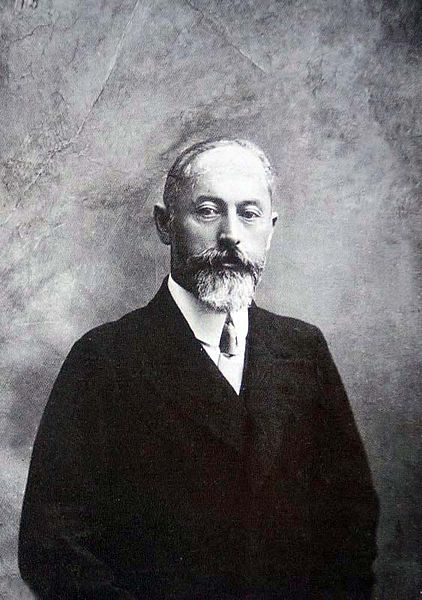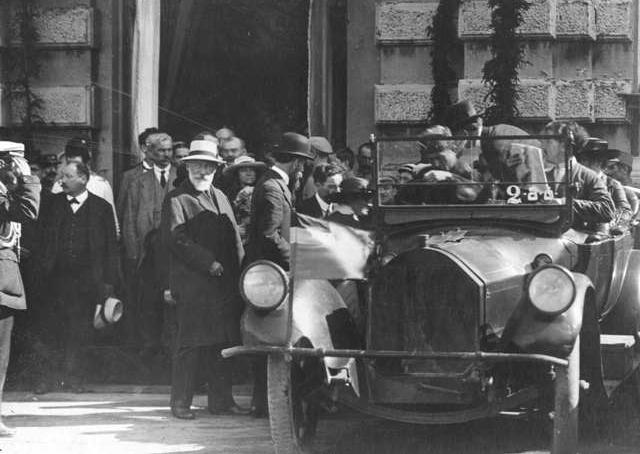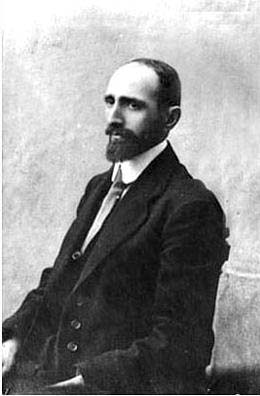<Back to Index>
- Journalist and Politician Noe Zhordania, 1868
- 1st Prime Minister of Georgia Noe Besarionis dze Ramishvili, 1881
PAGE SPONSOR


Noe Zhordania (also transliterated as Jordania; Georgian: ნოე ჟორდანია; Russian: Ной Никола́евич Жорда́ния) (January 2, 1868 – January 11, 1953) was a Georgian journalist and Menshevik politician. He played an eminent role in the Social Democratic revolutionary movement in Imperial Russia, and later chaired the government of the Democratic Republic of Georgia from July 24, 1918 until March 18, 1921, when the Bolshevik Soviet Russian Red Army invasion of Georgia forced him into exile to France. There Zhordania led the government - in - exile until his death in 1953.
Noe Zhordania was born on March 9, 1869, to a petty landowner in the village of Lanchkhuti in Guria, western Georgia, then part of the Kutais guberniya of Imperial Russia. He then moved to Tiflis where he graduated from the Georgian Orthodox Theological Seminary, a prestigious academic institution of the time. In 1891 he moved to to Warsaw, Poland, and attended the Warsaw Veterinarian Institute. It is during this period of his life that young Zhordania acquainted himself with the ideas of Marxism.
Returning to Georgia, he propagated Marxist ideas among the workers of Tiflis and in the 1890s emerged as a leader of the first legal Marxist organization in Georgia, Mesame Dasi (the Third Group). In 1894, he was tried by the Russian authorities for his participation in the "League of Freedom of Georgia". Elected a delegate to the 2nd Congress of the Russian Social Democratic Labor Party (RSDLP) in 1903, he sided with the Menshevik faction and gained significant influence among them. In 1905 he edited a Tiflis based Georgian Menshevik newspaper Sotsial - Demokratia known for its fierce attacks on the Bolsheviks. During the Russian Revolution of 1905, he went against the armed uprising and advocated the creation of a legal workers’ party. On the 4th Congress of the RSDLP in 1906, he supported the idea of land municipalization. The same year, he was elected to the First State Duma for the Tiflis Governorate and became a spokesman for the Social Democratic faction. The 5th Congress of the RSDLP elected him into the Central Committee where he maintained his post until 1912. Having signed the "Viborg declaration", a protest against the dissolution of the First Duma, in December 1907, he was sentenced to three months of imprisonment. In mid 1912, he edited a Baku based legal Menshevik newspaper Nashe Slovo. In 1914, he collaborated with Leon Trotsky in the magazine Borba where he published a series of articles on the question of nationalities.
During the World War I years, he maintained a “defensist” position and worked for Georgi Plekhanov’s Samozaschita (1916). After the February Revolution of 1917, he chaired the Tiflis soviet and on March 6, 1917 was elected a commissar of the executive committee of the Tiflis Soviet. In August 1917, he was elected to the Central Committee of the RSDLP(u[nited]). On the session of the Tiflis Soviet of September 3, 1917, he made a speech calling the workers not to succumb to the Bolshevist sentiments, but rather to fight for the establishment of a parliamentary republic. In October 1917, he joined the all - Russian Pre - Parliament, but soon became disillusioned in it and returned to his native Georgia. On November 26, 1917, he became a chair of the Presidium of the National Council of Georgia and played a leading role in the consolidation of the Menshevik power in Georgia. His wavering position on the formal secession from Bolshevist Russia ended in May 1918, and Zhordania effectively chaired a parliament session which declared the independent Democratic Republic of Georgia. On July 24, 1918, he became a Head of the Government of Georgia.
Within the three years of rule, his government organized a successful land reform, adopted comprehensive social and political legislation, and cultivated widespread international ties, enabling Georgia to become the only Transcaucasian nation to earn de jure recognition from Soviet Russia and the Western powers. Apart from a massive peasant support, his government managed to gain, through combining socialism, democracy and a moderate form of nationalism, the loyalty of intellectual élites and nobility, and played a crucial role in transforming Georgia into the modern political nation. However, the invasion of the Soviet armies in February – March 1921 toppled down the Georgian government, forcing Zhordania and many of his colleagues to take refuge in France where he led the government - in - exile and continued his efforts to earn the international recognition of the Soviet occupation of Georgia and a foreign support for the Georgian independence cause until his death in Paris in 1953.
In 1923, Noe Zhordania made an appeal to Washington on which he said:
| “ | In the twentieth century, before the eyes of the civilized world, I appeal to the conscience of civilized nations and all honest people to condemn this persecution of a small nation and the criminals inspiring and carrying out these barbarous acts — the Bolshevik Government. | ” |
He also said in the appeal that Chekists had killed without trial hundreds of people, including women and children, many of them from the Georgian intellectual class.
Zhordania was buried on Leuville - sur - Orge Cemetery in France.

Noe Besarionis dze Ramishvili (Georgian: ნოე რამიშვილი; his name is also transliterated as Noah or Noi) (1881 - December 7, 1930) was a Georgian politician and the first Prime Minister of Georgia. He was one of the leaders of the Menshevik wing of the Russian Social Democratic Labor Party. He was also known by his party noms de guerre: Pyotr, and Semyonov N.
He joined the Russian Social Democratic Labor Party in 1902 and soon became a prominent spokesman of the Mensheviks. Following the 1917 Bolshevik October coup he became one of the leaders of Georgian National Soviet and was appointed, on April 22, 1918, an Interior Minister of Transcaucasian Democratic Federative Republic, a loose federation of Georgia, Armenia and Azerbaijan.
On May 26, 1918, Georgia became an independent state as a Democratic
Republic of Georgia. Ramishvili was elected a Chairman of the Government
and was replaced by his close associate, Noe Zhordania
on July 24, 1918. In a new government, Ramishvili accepted a post of
Interior Minister. Since March 1919, he simultaneously held also the
posts of Minister of Education and Defense Minister. He was frequently
criticized by the Georgian opposition for his harsh reaction to the
peasant disturbances in 1918 and 1919; yet his role in preventing
large scale Bolshevik revolts cannot be overlooked.
After the Soviet Russian forces occupied the country in February – March 1921, Ramishvili emigrated to France, but did not cease his efforts to undermine the Bolshevik dictatorship. He sponsored the preparation for the 1924 August Uprising in Georgia, which ended unsuccessfully and was followed by mass repressions against the Georgian nobility and intellectuals.
Ramishvili was one of the most prominent leaders of the Poland guided anti - Soviet Prometheism movement. In 1930, he was assassinated in Paris, France, by a Bolshevik spy.